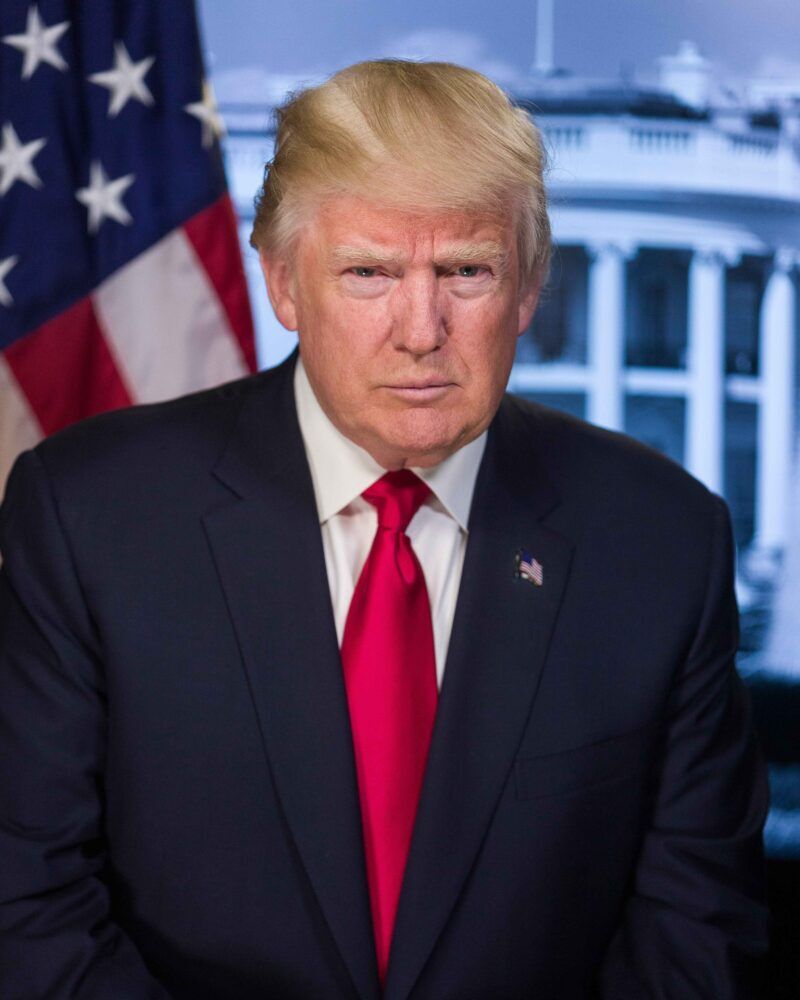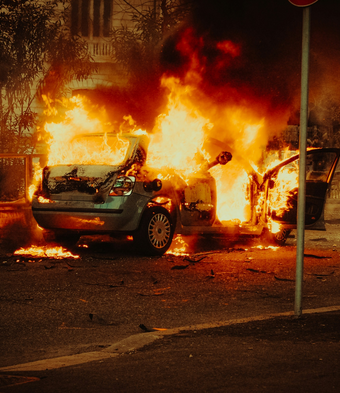Donald Trump and the paradox of power

What more can you say about Donald J Trump? I must confess, it’s with some trepidation that I write about him myself. Trump is rarely out of the headlines, normally by his own volition. This week, though, has seen the 45th President of the United States of America indicted for a third time, on the most serious charges yet: spreading lies about election fraud that risked the future of the presidency and American democracy itself.
It is little over two and a half years ago that the world watched on in horror as America was torn apart; the ‘leader of the free world’ looked more like a tinpot dictator, as more than 2000 rioters descended upon the Capitol Building, vandalised the offices of the House Speaker Nancy Pelosi and various other members of Congress, and chanted ‘Hang Mike Pence’, whom Trump had himself criticised just hours earlier. 138 police officers were injured in the attack. 5 people died.
Trump had claimed, with no evidence, that the election had been ‘stolen’ from him, had put pressure on Vice-President Pence to refuse to certify President Biden’s election despite knowing it would be illegal to do so (Trump’s response was ‘You’re too honest’), had instructed his supporters to march on the Capitol while carrying his Bible, and had told them "If you don't fight like hell, you're not going to have a country anymore".
He now stands accused of conspiracy to defraud the United States, conspiracy to obstruct an official proceeding, obstruction of an official proceeding, and conspiracy against rights.
And yet in the Republican polls, Trump is the clear frontrunner to be the Presidential candidate next year, with his 51% support now dwarfing that of his closest contender Ron DeSantis. In the event that he faced off again against Joe Biden, the two candidates would be neck and neck, with 43% support each. Trump himself, with typical gusto, declared, “I NEED ONE MORE INDICTMENT TO ENSURE MY ELECTION!”
It goes without saying that such a tale would have meant the end of the political career, legacy, and the personal freedom of just about any other leader in the West. It feels better suited to the annals of Ancient Rome than to Washington. But this is Donald Trump, and this is 21st century America, a world where concepts like ‘truth’, ‘integrity’, and even ‘Christian’ seem to have lost their meaning.
I am not going to offer commentary on the case itself; a case which itself seems to turn on Trump’s mental state and inner thoughts and beliefs which (as we saw with Boris and the Partygate investigation) may prove almost impossible to conclusively determine. Nor would I wish to say that Christians cannot vote for a candidate like Trump (regardless of what I myself would or wouldn’t do). God has given us all different consciences. Many factors go into a vote, not least, the alternative candidates; some may feel they have to vote for an unpalatable candidate while gritting their teeth, as their opponent might be even worse.
And we also cannot be so simplistic as to say that - however much we may dislike any President, Prime Minister or politician - all they do is bad. At CARE we welcomed the overturning of Roe vs Wade (the controversial 1973 ruling that abortion up to 20 weeks was a constitutional right) last year, which was made possible through Trump’s work as President with the Supreme Court appointments. God has used all kinds of figures - Christians, pagans, atheists - throughout human history as political leaders, and can accomplish his purposes through any of them.
But what lessons can we learn from what is going on in America, and in particular, from the way Trump has been so supported by many evangelicals?
At the heart of the answer, I think, is Christians’ relationship with power.
The paradox of power
On one level, we quite like the idea of power; not necessarily because we want to be in control (although that can sometimes be the case), but because we want to do good. It was this, I suspect, that led many evangelicals to vote for Trump. A candidate who promised to defend the rights of the unborn? Someone who would fight back against the prevailing LGBT orthodoxy? Who would protect Christian freedoms? What an opportunity! Christians vote (in the vast majority of cases) for very well-intentioned reasons.
For it is much easier to change things when you are in power. We want to use power to speak up for the powerless. At CARE we know well the frustration of not always being able to change things, of feeling like we are a ‘lone voice in the wilderness’ when we speak about human trafficking in the Illegal Migration Bill or outdated gambling legislation on football shirts (even if we did manage to secure some concessions from the Government about Online Safety recently!).
But the church has not always been very good at being in power. We are still sinners, and remain susceptible to corruption, hypocrisy and abuse, just like everyone else.
We’ve seen it throughout history: for the first three centuries of its existence or so, the church was not in power; persecuted by Rome, living in poverty, eschewing violence. It changed after the conversion of the Roman Emperor, Constantine, to Christianity, and the legalisation of the Christian faith in AD 313 via the Edict of Milan. Church and state soon formed an alliance, Christians began to be seduced by power, wealth and luxury, and the persecuted became the persecutors, eventually spreading the gospel by the sword, rather than by the Spirit.
The theologian Chris Wright puts it starkly, in words which seem very relevant today:
“It seemed natural, perhaps even providential, that the power of the state should promote and protect the interests of Christianity, while it might be hoped that Christianity would sanctify the workings of the state. Unfortunately, the price Christianity paid for its protection was its own corruption and complicity in the greed, ambition, immorality, endless conflicts, and endemic violence of all-too-fallen and sinful human power structures, and those who used them for their own enrichment. In gaining the world (or at least a continent), we lost our own soul…When we declare that Jesus is Lord and not Caesar, we are acknowledging that we are called to follow the Jesus of the cross, not the Jesus of Constantine.”
Power — a better way
Power is not a bad thing in and of itself, but as Christians, we have to be careful how we use it. The world around us says that you can do what you like to gain power, and do whatever you can to keep it: it’s something we’ve seen keenly in the UK in the last 3 or 4 years in the rise and fall of Boris Johnson. But Jesus shows us a different - and better - way.
1. Power is from God and for God
Jesus recognised the true source of power. In his conversation with Pilate, he said, “You would have no power over me if it were not given to you from above.” Power is from God; and it is also to be used for God. During his time on earth, Jesus submitted to the will of his heavenly Father. But if power is a gift which we are to steward, and if God sets the agenda, this should prompt a sense of humility. After all, “God’s ways are not our ways”, and his purposes are not always easy to discern. The Bible is full of warnings about the way God raises up some nations; and brings down others.
This seems to have been lost in contemporary America, where, within some sections of evangelicalism, there is the sense that God has called the USA into being as a special people (almost in the way he chose Israel to be his people). The well-known author Collin Hansen tells a story about a dinner he had with a Trump supporter:
“This person explained to me that America is the last hope of Christianity, that America is the last hope of Christianity, and I thought that I simply misheard. It could not have been what he was saying…I corrected him, said, “You mean Christianity as the last hope of America, right?” He said, “No, America is the last hope of Christianity.” That’s Christian nationalism.”
Empires rise and fall, and the mightiest kingdoms do not last. Once Nebuchadnezzar, the King of Babylon, the world superpower, had a dream about four kingdoms, none of which would last. Daniel even addressed him: “Your Majesty, you are the king of kings.” But the reason why, was that “The God of heaven has given you dominion and power and might and glory.” The Lord gave to Nebuchadnezzar, and soon he would take away. Babylon fell, Persia fell, Greece and Rome fell. There is no reason why America should be any different. We are not the heroes of the story. God is.
2. Power is to serve others, not ourselves
Jesus offered a completely different vision of kingship to the world around him. He told his disciples on the night before he died: “The kings of the Gentiles lord it over them; and those who exercise authority over them call themselves Benefactors. But you are not to be like that. Instead, the greatest among you should be like the youngest, and the one who rules like the one who serves. For who is greater, the one who is at the table or the one who serves? Is it not the one who is at the table? But I am among you as one who serves.” (Luke 22:25-27)
The greatest, most earth-shattering event the world has ever seen came when Jesus refused to use his power. He said when he was arrested, “Do you think I cannot call on my Father, and he will at once put at my disposal more than twelve legions of angels?” (Matthew 26:53), but let the Sanhedrin try him, the authorities flog him and the soldiers crucify him; true power, for Jesus, came through submission and service of others.
Jesus did not seek to cling to power, but looked to make himself nothing in humility. He was in very nature God, yet “did not consider equality with God something to be grasped,” submitting himself to death on a cross.
The contrast with Donald Trump (and his supporters), desperately clinging to power with his last-ditch phone calls to Mike Pence, or his rallying cry to the rioters, could not be more stark. Indeed, there have even been suggestions he is only running for President again now in order to avoid going to prison.
3. Power requires integrity, not hypocrisy
The standards Jesus sets us are impossibly high: in his teaching on the Sermon on the Mount, he concluded, “Be perfect, just as your heavenly father is perfect.” (Matthew 5:48). But he himself lived it out, to the extent that the Sanhedrin could not find anything he had done wrong. He lived his life, in every area, with integrity. He was not good at some things and bad at others. Mark writes, “The chief priests and the whole Sanhedrin were looking for evidence against Jesus so that they could put him to death, but they did not find any” (Mark 14:55).
Of course, we cannot expect any human politician to be perfect. But we would expect anyone who claims to be a Christian - as Donald Trump has - to display good fruit, and to at least strive to honour Jesus in all he does.
No Christian can deny that Trump has done some things which are good, with his impact on abortion laws being a particularly conspicuous example. And yet one really has to wonder how serious his own personal convictions are when his administration institutes a border policy which rips away immigrant children from their parents, including infants (hundreds have never been reunited), or even puts them in cages.
That does not seem like the policy of someone who is truly pro-life, to put it mildly. Perhaps the account of his former deputy Mike Pence about his attitude to the Bible says it all.
“I once invited President Trump to Bible study. He really liked the passages about the smiting and perishing of thine enemies. As he put it, ‘Ya know, Mike, there’s some really good stuff in here.’”
Which king do we follow?
As I’ve been reflecting in the last couple of days, I’ve felt there’s been a real irony in the way some evangelicals have latched onto Trump as a political Messiah. Rather than looking like Jesus, I almost wonder whether he looks more like Herod.
For like Trump, Herod too achieved things which pleased his subjects. He was responsible for the refurbishment and dramatic expansion of the Jewish Temple, turning it from a disappointment into such a spectacle that the disciples said to Jesus, “What massive stones! What magnificent buildings!” (Mark 13:1).
But Herod too did not act with integrity. He erected a golden eagle at the entrance to the Temple, a symbol of Rome rather than of God. Herod too clung to power, to the extent that he executed three of his own sons amid rumours of conspiracy, as well as massacring the baby boys of Bethlehem. And Herod too did not understand that all he had been given was a gift from a God whose purposes were much wider than he realised. He believed that he himself was the ‘King of the Jews’; he was not willing to stand aside for the true King who had come into the world. One does wonder sometimes whether if Jesus came back, Trump would claim ‘Fake News’ and criticise him for being weak!
Who knows quite what the next few months will hold in American politics; no doubt there will be plenty more twists and turns along the way.
But let us all, regardless of who we vote for, meditate upon the dangers of power, and look to imitate Jesus, the true Messiah, who - unlike every other human leader, from Herod through to Trump - shows us a better way to live.
For one day, every human leader will fade, and before Him, every knee will bow, “in heaven and on earth and under the earth, and every tongue acknowledge that Jesus Christ is Lord, to the glory of God the Father.”






